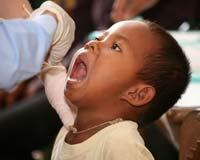Kindness in Action

It began innocently in 1993, over a cup of tea at a kitchen table when Dr. Amil Shapka of St. Paul, Alberta put his money where his mouth was.
He wrote a cheque to help a friend doing some development work for the poor of Honduras.
The money helped finance a dental team of four and provided the foundation of the group Kindness in Action.
From that simple beginning, Kindness in Action would develop a life of its own, growing into an organization with over two hundred volunteers working on weekly projects in seven countries.
With a focus on oral health, the Alberta-based group’s central objective is to provide dental health services, “doing as much as we can with what we have.”
Last week, a group of Canadian dentists were in Pilippine city of Dagupan, Pangasinan for a three–day mission at the University of Luzon (UL) campus.
The Kindness in Action (KIA) team, composed of a dozen dentists and volunteers, were welcomed in an opening ceremony Friday, before the actual dental clinic mission.
Dr. Barry Crowley, head of the delegation, said this is the second time that the group is visiting the Philippines. The first was in 2005 during their Southeast Asian trip.
Crowley said KIA started in 1993 but was organized into a group in 1994 with a group of medical people that went to Nicaragua. From then on the dental mission has grown overwhelmingly, he said.
“From seven people, the group now has 250 members,” Crowley said. This year, the group will be doing 23 missions all over the world including South America, Central America, Cambodia and the Philippines. The group has also conducted missions in Africa in the past years.
Crowley said the dentists pay for their trip from their own pockets while KIA pays for all the dental materials and equipment needed for the mission.
The group also gets donations back home from “some people who want to go but just could not.” The supply house in Canada has been generous to them and a couple of charity groups donate to KIA, he explained.
“There are a lot of generous people around the world, like you people here. You give up a lot and do so much. You make us feel so welcome coming here,” Crowley gushed.
Very notable among the dentists is their appreciation for the hospitality and generosity of Dagupenos, local media reported.
“We are all taken aback by the kindness and hospitality of the people here. Excellent reception!” said retired dentist Michael Myer, the head of the delegation to Philippines in the 2005 visit.
The Philippines has a dismal record when it comes to oral health.
One KIA member writes on the website about her earlier experience in the Philippines.
“Working in and around Sipalay City in the Philippines this year, we had a young girl arrive for treatment. She was 13 years old and explained that her mother was employed in another city. Except for the occasional visit from her mother, this young lady lived alone and basically was raising herself. She heard about the Canadian dentists and decided that she should have her teeth checked and cleaned. She presented a mature and thoughtful attitude of one much older in years.
The work we do is hard. The conditions are difficult. The heat is oppressive. We may be sleeping on the floor. But these two weeks with KIA are without a doubt the best two weeks of my year - every year. The people we meet, the friends we make, the difference we make is hard to explain. And the difference this experience makes in me is beyond measure.”
A National Oral Health Survey revealed that six-year-old children had on average nine decayed teeth in their mouth with 40 per cent of these teeth presenting caries with pulp involvement.
Twenty per cent of six-year-old children also reported toothache during the time of the survey and the condition is the main reason for school absenteeism in the Philippines.
For more information about Kindness in Action, contact [email protected]
Leave a comment






